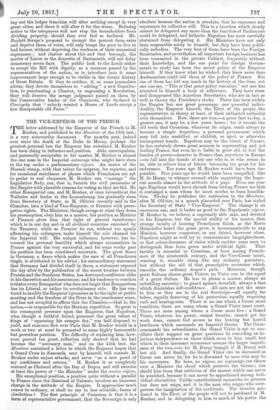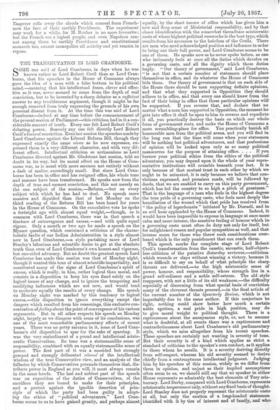THE VICE-EMPEROR OF THE FRENCH. T HE letter addressed by the
Emperor of the French to M. Rouher, and published in the Moniteur of the 13th inst., is a very noteworthy document. For months past, indeed over since the death of the Duke de Morny, perhaps the greatest personal loss the Emperor has sustained, M. Rouher has been rising in influence and position. Able, unscrupulous, and personally acceptable to his master, M. Rouher is almost the one man in the Imperial entourage who might have risen to the top under a parliamentary re'gline. An orator of the Disraeli stamp, with that talent for epigram, for repartee, and for occasional stateliness of phrase which Frenchmen are apt to prefer to real eloquence, M. Rouher can "manage" the Legislative Body, can, that is, furnish the civil janissaries of the Empire with plausible reasons for voting as they are bid. No other Bonapartist can, and M. Rouher, at once favourite at the Tuileries and leader at the. Luxembourg, has gradually risen from Secretary of State, as M. 011ivier recently said in the 'Chamber, into a kind of Vice-Emperor, or Premier with prero- gative rights. The Ministers, though savage at what they deem lais' presumption, obey him as a master, his position as Minister of Finance gives him that right of general interference which is in our day and in all civilized countries exercised by the Treasury, while as Premier he can, without too openly affronting his colleagues, make himself the sole channel for the Imperial will. His unique influence, however, has in- creased the personal hostility which always accumulates in France against the very successful, and for some weeks past his position has been considered uncertain. The great fiasco in Germany, a fiasco which makes the ears of all Frenchmen tingle, is attributed to his advice ; his extraordinary statement that Germany had divided itself in three, a statement exposed 'the day after by the publication of the secret treaties between Prussia and the Southern States, has destroyed confidence alike in his discretion and his assurances; and his tendency to reaction irritates every Bonapartist who does not forget that Bonapartism has its Liberal, or rather its revolutionary side. He has ven- tured to modify the Emperor's promises as to the right of public 'meeting and the freedom of the Press in the reactionary sense, and has not scrupled to affirm that the Chamber,—that is, the nation,—is responsible for the Mexican expedition. So great is the consequent pressure upon the Emperor, that Napoleon, who, though a faithful friend, possesses the great talent of kings of "squeezing his oranges dry," was half disposed to yield, and rumours flew over Paris that M. Rouher would in a week or two at most be promoted to some highly honourable hut powerless position. The difficulty of replacing him, how- ever, proved too great, reflection only showed that he had become the "necessary man," and on the 13th inst. the Moniteur contained a letter in which the Emperor hopes that a Grand Cross in diamonds, sent by himself, will console M. Rouher under unjust attacks, and serve "as a new proof of ray confidence and esteem." M. Rouher is as completely restored as Choiseul after the Day of Dupes, and will exercise at least the power of "the Minister" under the ancien re'ginte.
His exceptional position, a position quite without a parallel in France since the dismissal of Calonne, involves an immense change in the attitude of the Empire. It approaches much nearer to ordinary, or shall we say to less scientific, forms of absolutism ? The first principle of Caisarism is that it is a form of representative government, that the Sovereign is only absolute because the nation is absolute, that he expresses and represents its collective will. This is a function which clearly cannot be delegated any more than the function of Parliament could be delegated, and hitherto Napoleon has most carefully abstained from delegating it. His Ministers have not only been responsible solely to himself, but they have been politi- cally nobodies. The very best of them have been the Foreign Secretaries, and nevertheless all important foreign business has been transacted in the private Cabinet, frequently without their knowledge, and the one point for foreign Govern- ments to study has been the secret policy of the Emperor himself. If they knew what he wished, they knew more than Ambassadors could tell them of the policy of France. Not one of them has left any mark in the history of the time, not one can say, "This or that great policy was mine," not one has attracted to himself a body of adherents. They have risen and disappeared like American Secretaries, who are in fact as well as theory the President's clerks. There has been within the Empire but one great personage, one powerful indivi- duality, the Emperor himself, the Elect of the people, the representative, in theory at least, of their unlimited authority over themselves. Now, there are two,—a great fact to-day, a greater one, it may be, a few years hence ; for it reveals the old truth that CEesarism, whatever its origin, tends always to become a simple despotism, a personal government which may fall into unskilled, or childish, or aged, or otherwise incompetent hands. Napoleon may be the wisest of Ca:tsars, he has certainly shown great acumen in representing and yet leading France, but even he is liable to grow old, to feel the burden of power—heavier in France than anywhere in Europe —to fall into the hands of any one who is, or who seems to be, able to relieve him of labour becoming too great for his endurance. Ten years ago M. Rouher would have been im- possible. Five years ago he would have been compelled, like M. de Moray, to whisper counsel while supporting the Impe- rial mantle almost in the attitude of a page. Even one year ago Napoleon would have shrank from letting France see that it contained a man whom he must soothe, as from humilia- tion. To-day he publishes the confession in the Moniteur, after M. 011ivier, in a speech placarded over Paris, has styled the Secretary of State "Vice-Emperor." The change is an enormous one, and it bodes no good to the Napoleonic regime- M. Rouher is, we believe, a supremely able man, and devoted to his Emperor, but the special ability of his master, that strange faculty of hearing Frenchmen think, as the Norse Heimdaller heard the grass grow, is incommunicable to any Minister, however competent, or any friend, however close. Napoleon might as well try to communicate longsightedness, or that colour-keenness of vision which enables some men to distinguish blue from green under artificial light. That faculty is essential to Cmsariam, at least among French- men of the nineteenth century, and the Vice-CEesar must, wanting it, stumble along like any ordinary potentate, but without the aid of that prescriptive reverence which smooths the ordinary despot's path. Moreover, though great Sultans choose great Viziers, no Vizier can be the equal of a great Sultan. He has to please a master, always an enfeebling necessity ; to guard against downfall, always a fear which diminishes self-confidence. All men are not the same to him as they are to the real Sovereign—all equally far below, equally deserving of his protection, equally requiring curb and bearing-rein. There is no one whom a Camar must conciliate, there are many whom a Grand Vizier must court. There are none among whom a CEesar must live ; a Grand Vizier, whatever his power, cannot breathe, cannot get his work done, cannot feel secure in the bracing but horrid loneliness which surrounds an Imperial throne. The Ca3sar commands his subordinates, the Grand Vizier is apt to con- ciliate their support on great questions by conceding an in- jurious independence on those which seem to him small, but which in their incessant recurrence assume the larger import- ance of the two,—to let M. Duruy brangle if M. Du.ruy will but aid. And finally, the Grand Vizier can be discussed as Csesar can never be, for he is discussed by men who may be his successors. No laws, no rigour, no espionage can throw over a Minister the cloud which protects the throne ; can shield him from that criticism of the masses which can never be punished, because it can never be apportioned among indi- vidual obscurities. Unlike constitutional monarchs, he governs but does not reign, and it is the man who reigns who over- powers the imagination of the multitude. The blunder par- doned in the Elect of the people will not be pardoned in M. Rouher, and in delegating to him so much of his power the Emperor rolls away the clouds which conceal from French- men the face of their earthly Providence. The experiment may work for a while, for M. Rouher is no mere favourite ; but the French are a logical people, and even Napoleon can- not among them be earthly Providence and constitutional monarch too, cannot monopolize all activity and yet remain in repose.































 Previous page
Previous page